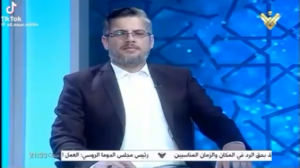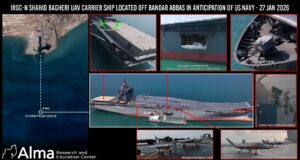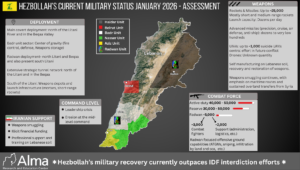British (The Guardian) and German (DW) media sources warn that the pressure to rapidly advance Hezbollah’s disarmament could endanger Lebanon, leading to internal clashes and even civil war, and that a gradual and slow process must be adopted. According to them, before disarmament takes place, efforts must focus on state building and strengthening of state institutions. In addition, it is argued that Hezbollah members should be integrated into the process of state building in order not to isolate or alienate the organization’s members.
The problem with the approach that suggests disarmament should be carried out slowly and only after the process of state building is complete is that time plays in Hezbollah’s favor. Hezbollah’s hope is that, over time, the determination and stamina of Israel, the Lebanese government, and the United States to act against it will fade and diminish. Therefore, from its perspective, the strategy is always to drag out the process as much as possible in order to enable its military rehabilitation.
The Lebanon’s government decision to disarm Hezbollah, which was made under American pressure, led Hezbollah to threaten that it would not relinquish its weapons even at the cost of civil war. Hezbollah’s position is that first Israel must withdraw from Lebanon and stop its attacks, and then the organization will be willing to discuss the issue of weapons (it is important to emphasize that Hezbollah does not commit to disarmament in exchange for Israel’s withdrawal but only to discuss the matter). This is accompanied by Hezbollah’s declarations that weapons are the identity and honor of Hezbollah, that it is better to die than to surrender the weapons, that Hezbollah is Lebanon’s protector against Israel, and that it will never abandon the resistance.
Recently, a new argument has entered the organization’s “arsenal” of narratives, according to which since the fall of the Assad regime Hezbollah has also been defending Lebanon from attacks by Sunni jihadists from Syria. This narrative is based on the legacy of the battles Hezbollah fought together with the Lebanese army against ISIS in the Arsal area on the Lebanon–Syria border in 2017. Alongside the reconstruction of its infrastructure and military capabilities, Hezbollah is also rebuilding its arsenal of excuses and narratives for why it must hold on to its weapons and why it must continue to arm itself.
In the face of Hezbollah’s ongoing efforts at rehabilitation, Israel acts on a daily basis to thwart the threat (the Alma Center continuously monitors these rehabilitation attempts and refers to them in numerous publications). Despite official condemnations, Israeli activity and the fear of escalation constitute the Lebanese government’s main leverage against Hezbollah, and therefore the need to act now while Hezbollah is weakened and while the Israeli government is determined to keep it weak.
Hezbollah, of course, has no interest in state building or in strengthening the Lebanese government. Its power derives from Lebanon’s rifts and weakness, which allow it to maintain a state within a state and to keep its Shiite base loyal to Hezbollah and alienated from the state. For decades, it has used its political power to protect its own interests at the expense of Lebanon’s wellbeing. Hezbollah serves only its own interests and Iran’s interests in the Middle East. The dismantling of Hezbollah is not only disarmament, but also the dismantling of its political and economic power. The integration of Hezbollah members into the political process would harm the stability of the government and the ultimate goal of Hezbollah’s complete dismantlement in Lebanon.
Strengthening the Lebanese government and the Lebanese army are very important steps, but these are processes that will take a long time. Therefore, they must be carried out in parallel and not before action is taken against Hezbollah. Strengthening the Lebanese state is a result of Hezbollah’s dismantling; as long as Hezbollah exists, it will work to weaken Lebanon. The Lebanese government’s success in dismantling Hezbollah and enforcing its authority throughout all parts of the country is the first and most important step in strengthening and rebuilding the state.
Alongside international pressure, there are also considerable efforts to strengthen the Lebanese state and the Lebanese army. For example, in talks held in Lebanon on August 18, Tom Barrack and Morgan Ortagus presented economic incentives, international investments, and even indirect cooperation with Israel in order to implement an economic-political strategy and not only a security one.
As a result of the war, conditions have emerged that allow the Lebanese government to act against Hezbollah: the damage to the organization’s military, economic, and political capabilities; the weakening of Iran and the Shiite axis; the fall of the Assad regime and the loss of the corridor from Syria; as well as American and international backing for the Lebanese government.
It is clear that disarming Hezbollah is a complex process whose chances of success are lower than its chances of failure. Hezbollah will not relinquish its weapons voluntarily, and it is likely that the Lebanese army will be forced to confront Hezbollah if it seriously attempts to dismantle it (unlike what is happening today). Delaying the move will only allow Hezbollah to recover and grow stronger, so that in the future a confrontation with it will be even more dangerous.
So far, the scope of the Lebanese army’s activity in disarmament has been very limited. According to The Guardian’s report, the reason for the lack of evidence stems from the Lebanese government’s desire not to provoke Hezbollah too much by publishing information about confiscated weapons caches. However, the Lebanese army and the Lebanese government have not held back from releasing numerical reports on activity south of the Litani. So why are visual proofs not being published in the same scope as the figures reported?
Therefore, until the completion of Hezbollah’s disarmament process, Israel cannot withdraw from Lebanon or stop its attacks. An Israeli withdrawal would be a moral victory for Hezbollah and would allow it and its base to grow stronger and undermine the authority of the state. It is clear that Hezbollah is already preparing its propaganda campaign about its “divine victory.” The campaign will begin the minute Israel starts to withdraw from the five strategic points it has seized on Lebanese soil.
Hezbollah is preemptively constructing the narrative for the failure of the process and the deterioration of the situation, in which it will blame Israel and the United States. This narrative must not be promoted, and the pressure on Hezbollah must not be eased.
Lebanon’s choice is not between war with Hezbollah or with Israel, but between an independent and sovereign Lebanon within its territory or a fragmented Lebanon that submits to the dictates of Iran and Hezbollah.
The United States is exerting pressure not only on Lebanon but also on Israel. After the Lebanese government made the decision to disarm Hezbollah, the United States asked Israel to restrain its attacks in Lebanon and allow the Lebanese army to act.
In response, Prime Minister Netanyahu announced on August 25 that Israel appreciates Lebanon’s decision and is prepared to support Lebanon in its effort to dismantle Hezbollah’s weapons. If the Lebanese security forces take steps toward disarmament, Israel will take reciprocal measures, including a gradual reduction of the IDF’s presence in coordination with the United States.
The likelihood that the Lebanese army will succeed in independently dismantling Hezbollah’s weapons completely (or even partially) is, to say the least, not high. Therefore, Israel must be cautious and avoid carrying out a withdrawal prematurely, both physically from the five areas in Lebanon and from its offensive activity against Hezbollah’s rehabilitation. Incorrect timing would allow Hezbollah to restore its military and political capabilities and once again become a significant threat to Israel. In any case, Israel must maintain its freedom of action against Hezbollah.
Photo Source: Shutterstock







2 Responses
Dear Zoe,
The panic and fear of illegitimate rulers does not change the fact that hezbollah must be destroyed rather than disarmed. Their core world view is incompatible with legitimate governance. They will always take up arms at the first opportunity. Justice must be executed against the wicked, who seek to destroy the innocent.
Dear Zoe,
Regarding the European media bias:
This is a result of post modernist delusion.
The illusion that the will of man can be exalted above God and God’s Law, in the name of “democratic values” akin to Sodom and Gomorrah, is absolute delusion. It is Europe and all those who believe these lies who need to change course, including some within Israel.